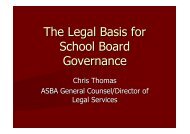The Arizona Open Meeting Law - Arizona School Boards Association
The Arizona Open Meeting Law - Arizona School Boards Association
The Arizona Open Meeting Law - Arizona School Boards Association
Create successful ePaper yourself
Turn your PDF publications into a flip-book with our unique Google optimized e-Paper software.
item in executive session with the public body's attorney, the agenda should plainly say so.<br />
For example, the agenda might include a provision stating "<strong>The</strong> Board may vote to hold<br />
an executive session for the purpose of obtaining legal advice from the Board’s attorney<br />
on any matter listed on the agenda pursuant to A.R.S. § 38-431.03(A)(3)."<br />
7.7.3 Contents of the Agenda--Executive Session. <strong>The</strong> agenda for an executive session<br />
must contain a "general description of the matters to be considered" A.R.S. § 38-<br />
431.02(I). <strong>The</strong> description must amount to more than just a recital of the statutory provisions<br />
authorizing the executive session, but should not contain any information that<br />
"would defeat the purpose of the executive session, compromise the legitimate privacy<br />
interests of a public officer, appointee or employee or compromise the attorney-client<br />
privilege." Id. In preparing executive session agenda items, the public body must weigh<br />
the legislative policy favoring public disclosure and the legitimate confidentiality concerns<br />
underlying the executive session provision. For example, if a board desires to consider<br />
the possible dismissal of its executive director, the board may list on the agenda<br />
"Personnel matter -- consideration of continued employment of the board's executive<br />
director." However, when the public disclosure of the board's consideration of charges<br />
against an employee might needlessly harm the employee's reputation or compromise the<br />
employee’s privacy interests, the board may eliminate from the agenda description the<br />
identity of the employee being considered. If it is already publicly known that the board<br />
is considering charges against the employee, disclosure of the employee's identity in the<br />
agenda would not defeat the purpose of the executive session.<br />
7.7.4 Distribution of the Agenda. <strong>The</strong> agenda may be made available to the public<br />
by including it as part of the public notice or by stating in the public notice how the public<br />
may obtain a copy of the agenda and then distributing the agenda in the manner prescribed.<br />
A.R.S. § 38-431.02(G). Because both the public notice and the agenda must be<br />
available at least twenty-four hours in advance of a meeting, the simplest procedure is to<br />
include the agenda with the public notice. However, when the public notice is issued well<br />
in advance of a meeting, as in the case of notice of regularly scheduled meetings, see<br />
Section 7.6.6, it may be more appropriate to state how the public may obtain a copy of the<br />
agenda and distribute it accordingly.<br />
7.7.5 Consent Agendas. Public bodies may use "consent agendas" so long as certain<br />
requirements are met. Consent agendas are typically used as a time-saving device when<br />
there are certain items on the agenda which are unlikely to generate controversy and are<br />
ministerial in nature. Some examples are approval of travel requests and approval of minutes.<br />
Public bodies often take one vote to approve or disapprove the consent agenda as a<br />
whole. When using a consent agenda format for some of the items on a meeting agenda,<br />
public bodies should fully describe the matters on the agenda and inform the public where<br />
more information can be obtained. A good practice is to require that an item be removed<br />
from the consent agenda upon the request of any member of the public body. Public bodies<br />
should take caution when using consent agendas. <strong>The</strong> <strong>Arizona</strong> Supreme Court has held<br />
that taking legal action, including that taken after an executive session, must be preceded<br />
by a disclosure of "that amount of information sufficient to apprise the public in attendance<br />
of the basic subject matter of the action so that the public may scrutinize the action taken<br />
during the meeting . . . ." Karol v. Board of Educ. Trustees, 122 Ariz. 95, 98, 593 P.2d 649,<br />
652 (1979). <strong>The</strong> court also specifically condemned the practice of voting on matters designated<br />
only by number, thereby effectively hiding actions from public examination. Id.<br />
- 28 -



